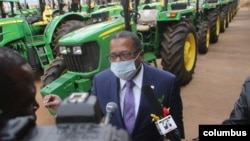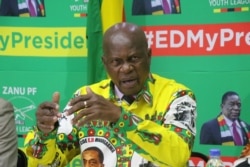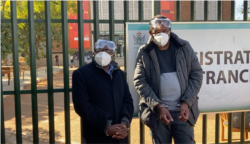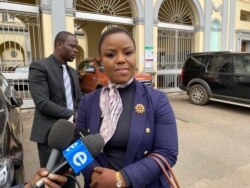Zimbabwe’s ruling ZANU-PF party spokesman Patrick Chinamasa late Monday lashed out at the U.S. government and U.S. Ambassador Brian Nichols.
Chinamasa claimed the U.S., through Nichols, was backing Zimbabwe’s main opposition party, the Movement for Democratic Change, via anti-government protests scheduled for Friday.
“If he continues to engage in acts undermining the republic, mobilizing and funding disturbances, coordinating violence and training insurgency, our leadership will not hesitate to give him marching orders," said Chinamasa. "Diplomats should not behave like thugs and Brian Nichols is a thug … We remind Nichols that he is not a super diplomat in this country. … We have nothing to learn from the United States.”
The U. S. Embassy in Harare had no immediate reaction to the remarks or the threat to expel Ambassador Nichols.
Alexander Rusero, a former international relations and security studies lecturer at Harare Polytechnic College, says disunity within the ruling ZANU-PF is behind the recent verbal attacks on the US.
“Because it’s undiplomatic, it’s uncalled for, for party functionary calling United States of America ambassador a thug at the backdrop of [Zimbabwe] government having forked out $500 to $900 million United States dollars, hiring public relations firms, trying to appease the angry spirits of the Americans," said Rusero. "It tells you that we are back to the mode of 2001-2007, the mode of confrontational, militant diplomacy so to speak.”
Tensions with Zimbabwe surfaced after the U.S. Embassy last week spoke out against police arresting a prominent journalist and an opposition leader.
Police claimed reporter Hopewell Chin’ono and Transform Zimbabwe’s Jacob Ngarivhume were stoking violence for Friday’s anti-government protest.
The U.S. called the arrests an attack on free press and freedom of speech.
Supporters of the two men say they are being persecuted for speaking out against government corruption.
Zimbabwe police Monday night released a wanted list of 14 political activists without listing any alleged crime.
Spokeswoman for the opposition Movement for Democratic Change party Fadzayi Mahere called the list an act of intimidation.
“We take the view that the publication of this wanted list to stifle, the attempt by citizens, all Zimbabweans who have announced their intentions to demonstrate peacefully on the 31st of July," said Mahere. "We view this as an attempt to intimidate citizens who want to exercise their rights under the constitution. We believe that the attempt to silence the public is unconstitutional, it’s colonial, it’s arbitrary, it must be challenged by every progressive Zimbabwean.”
Over the weekend Zimbabwe’s Minister of Information Monica Mutsvangwa claimed the U.S. had an “evil agenda” to destabilize Zimbabwe.
She offered no evidence to back her assertion.







